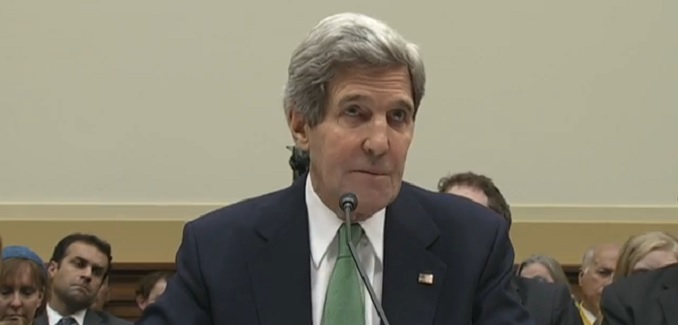Politico reports that testimony given today by Secretary of State John Kerry to the House Foreign Affairs Committee fell far short of convincing lawmakers to adopt the administration’s perspective on Iran, with Kerry not only stumbling in answering questions regarding the consistency of the White House’s read on Iranian calculations – administration officials have sought to simultaneously insist that sanctions coerced Iran into coming to the table and that new sanctions will push Tehran away – but failing more broadly to convince lawmakers that Iran’s nuclear program can be checked with the leverage that the U.S. currently has at its disposal. The outlet described “a rare display of House unity” with “all the members of the committee who questioned Kerry essentially [telling] him no.”
At the end of the three-hour hearing, House Foreign Affairs Committee Chairman Ed Royce (R-Calif.) and Ranking Member Eliot Engel (D-N.Y.) stood together in front of the cameras to say Kerry had done nothing to dissuade them from their interest in working out an arrangement with the Senate to pass a bill that would create new sanctions with a delay that would immediately be triggered if a six-month deadline passes without a satisfactory final agreement. Asked if Kerry was wrong to say this could endanger all the negotiations, they cited past examples of Congress pushing for sanctions over previous administrations’ objections. Royce said that despite Kerry’s warnings, their six-month delayed sanctions are “a pretty responsible way to make certain that the Iranians do indeed negotiate in good faith.”
A string of administration officials have recently been dispatched to the Hill as part of a campaign to persuade lawmakers to forgo passing new sanctions legislation. Javad Zarif, Iran’s foreign minister, this week threatened that any new sanctions legislation – up to and especially the type being considered in the Senate, which would impose new financial pressure only if the six months of upcoming negotiations failed – would cause Iran to abandon talks. Mark Dubowitz, the executive director of Foundation for Defense of Democracies (FDD), assessed that Zarif is essentially bluffing.
Given the state of the Iranian economy, Tehran needs relief from the toughest U.S. financial and energy sanctions. Otherwise, Iran faces continued stagnation or a renewed recession. For Iran to avoid those consequences, Tehran needs a final agreement or, at a minimum, a series of six-month renewable interim agreements that yield direct sanctions relief and a change in market psychology that increases consumer and investor confidence in the Iranian market. Without this, international companies are unlikely to resume business with Iran.
[Photo: AFP news agency / YouTube]




